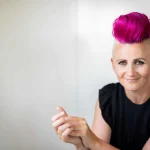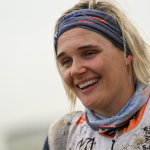Author: Kim van Kets
I am as outraged as you are when I heard the news of the violent death of Uyinene Mrwetyana in September last year, the heartbreak and the anguish felt physically unbearable. I was overwhelmed by grief and outrage. I was consumed with terror for our daughters. As I started to catch my breath and look […]
I am as outraged as you are when I heard the news of the violent death of Uyinene Mrwetyana in September last year, the heartbreak and the anguish felt physically unbearable. I was overwhelmed by grief and outrage.
I was consumed with terror for our daughters. As I started to catch my breath and look about me for some reassurance, support, solidarity, the voices I heard were those of other angry and terrified women. And I listened and searched for the voices of the good men pledging their solidarity and support.
But largely I couldn’t find them. And in trying to make the men I know understand that their silence made me feel abandoned, I used this analogy: “if some outrageous act was committed by a white person against a person of colour and no other white people spoke up or said ‘this is outrageous this is not ok, we are as horrified and heartbroken as you are, how can we work with you to fix it?’
If they didn’t volunteer those words, loudly, sincerely and quickly, if they remained silent, it would force me to assume they didn’t care. Even if they did. And many good men answered me privately and said:
“I do support you wholeheartedly, but my silence is because I didn’t know what to say, or I felt I had no right to say it or to grab center stage with my own anger, or I felt that my voice was not relevant, or it’s not about me.”
And although these reasons for silence were all good reasons and all true reasons, nevertheless their silence made me feel abandoned. When human beings are in pain, we need to know that we are not alone. We need people to say “I see your pain, I feel it too. I am so very sorry that this has happened.”
So although I know it’s not about me, that my voice is comparatively irrelevant, that I don’t want to grab center stage, I am nevertheless compelled to say: I am so sorry, my chest hurts from sharing your anguish. I am educating myself as much as I can, but please tell us how can we work with you to stop this?
And this is not only about America and about George Floyd. This is about race and about privilege and about South Africa and the world. It’s all about the community I live in.
Shall I tell you a story?
The other day we were driving home from the shop. It was a sunny week-day in the morning, we whizzed past a man walking along the road. As he disappeared into the distance Hannah says: “Mom, I think that man just got a gun out of his pocket!” And I go “Huh? Really? Why do you think that?” And she replies “I don’t know, and I don’t know if I saw right, but in my head there was a gun.”
So I say “ Hang on, lets go and see. But I’m pretty sure that he would not have a gun.” So I do a u-turn and then another one and hang out the window and offer him a lift.
He flash a big smile and jumps in the car. He has a roll of black dustbin bags in his hand. There is no gun. We drive about 3 km to the spot on the road near his house. We chat, he tells us he’s working night shift this week, that he misses spending all day with his baby because he has to sleep during the day, he pats my Staffie, Basil. We talk about the rural area his family comes from (near the same place as mine) we are pretty much neighbors, we find out that we share a clan name.
We part ways. Hannah says “Mom, I feel weird that I thought that, I feel bad about it.” So we speak about this thing. This jumping to the worst possible conclusion about someone without having any information about them other than their race and gender. And I ask her, “Would you have had the same thought if he was a woman? A woman of any colour?” And she said “NO. definitely not.”
“ And if he was a white man?” And she thought for a second and said “Probably not. No, I wouldn’t have thought that.”
“ And I asked, do you think that’s fair?”
And she said no, it wasn’t fair. And I asked her why she thinks this kind of thing happens in her head? Especially, even, her very particular head which has been taught since she was a little girl to unpack this sort of thing and interrogate it and reject this jumping to the worst conclusions.
And she said “I don’t know.”
And I said, “I don’t know either but it’s probably because of all the unconscious messages you receive all the time from a thousand sources. And that’s not your fault, but what you do with those messages becomes your fault. Can we agree that you will be aware of this happening and acknowledge that it happens when it does and be honest to yourself that you are doing it?
And stop in your tracks and deal with it and undo it and practice and practice and teach your friends to do the same? Can you think about how it would feel for you if people thought you were dangerous just because you were a girl? Or had blue eyes? Or pale skin?”
And may I tell you another?
I was running one of my favorite trails with a mate of mine in a wilderness area the other day. He is a young man and a much better runner than me. As we ran and he marveled at the beauty of the scenery, he turned to me for a minute and said, “You shouldn’t run here on your own, Aunty, it probably isn’t safe you know.”
“Ok, I hear you. Well, I am glad I have you to run with, then.”
“ I’m glad to have you to run with too, I would be scared to run here on my own.” I thought for a split second that he was joking. “What do you mean? What protection could this gogo possibly offer you? Why would a dude like you be nervous to run here?” But even as I asked him my heart smote me because I knew exactly what he was about to say and I felt no surprise:
“Because I would be afraid that someone would shoot me, especially if I’m running.”
He said this completely matter of factly. With no self pity in his voice.
“WTF? Whaddaya mean?” But even as I asked I knew exactly what he meant. Because where I come from, to many, many minds, a black man running allows folk to jump to the worst possible conclusion. It means he’s running from the scene of a crime. And it’s exactly this thought process that allows what happened to George Floyd.
And maybe just one more?
I was training with my adventure racing team and we had planned to run and cycle and paddle through the night to get used to sleepless nights. At about 4 am we found ourselves running on land owned by a notoriously vigilante type person. It was cold and we were wearing beanies and gloves and buffs covered the bottom half of our faces. Very little of our pale skin was showing. As I ran through the shadowy darkness I thought:
“Jeepers, I’m glad my team mates (2 big strong men) aren’t black …I would be so anxious for our safety running around here in the dark if they were.” And my next thought was: “OMG I hope that any trigger happy vigilante can see that they are white!”
Imagine having this sort of thought? It’s so not ok that we exist in a world where these thoughts are had.
So how do we fix this? How?
I don’t know how we fix it but I do know that the first step is acknowledgement that this is real and that it happens every day. Acknowledgement that this thing that we need to fix is the polar opposite of privilege. (“Disadvantage” isn’t a strong enough word.)
We need to be able to say, while my life may have been difficult, I have nevertheless benefitted every single day from the privilege of being white. Every day, through no effort of my own, folk jump to the best possible conclusion about me: Arriving at an interview or a meeting or a presentation, I am confident in the belief that I am accepted to be bright, articulate, moral, able, clever and non-threatening (until I demonstrate the opposite.) I receive the benefit of the doubt. And I receive this although I have done nothing to deserve it. Imagine experiencing the opposite? Imagine folk always jumping to the conclusion that you are not able or bright or moral? Or even worse that you pose a threat or are guilty of a crime.
Can you imagine the energy required to start every interaction on this kind of back-foot. To be constantly, exhaustingly having to prove yourself? And the constant need to prove yourself, that’s the best case scenario. The worst case is what happened to George Floyd.
I am aware of my privilege and I am aware of the system I have all been brought up in. I acknowledge my privilege. And I am so sorry about the story of George Floyd and all the stories like his that play out every day. My chest hurts from sharing your anguish.
I am doing my best to listen more than I talk (this is challenging for me.). I am educating myself as much as I can. Please tell me how can I work with you to stop this?
Contact Us at WeSpeak Global and follow us on Twitter
The articles, video and images embedded on these pages are from various speakers and talent.
These remain the property of its owner and are not affiliated with or endorsed by WeSpeak Global.

Having the right mentors will help you immensely on your path to pursuing your dreams and goals, Have you got a mentor? But there are some specific rules you should follow when finding the right mentor. Y ou can’t simply pick anyone to provide you with good advice and support. Here are my six key […]

Generosity is an interesting beast so WHY SO STINGY. As a charity CEO, I have seen it expressed in many different ways. The best kind of generosity comes with warmth and good old NSA – no strings attached. This kind of generosity is glorious to witness and is the backbone of charity work all over […]

The Dos and Don’ts of Handling Courageous Conversations at work or in your personal life that needs to happen that you keep putting off? We all face difficult conversations that need to be handled, but we all dread them. We can call these ‘Courageous Conversations’ because they oftentimes require so much courage to handle. In […]

To unlock employee motivation, you may need to change how you communicate special requests. These are things like important changes to operating processes or customer service procedures. You need people to embrace a different way of doing things. It has to be done right and it needs to be executed right away. But you notice […]

What’s on your resilience resume? For most people in North America, this week marks the first anniversary of the pandemic changing our lives. It started with disbelief, upheaval, and constant change and progressed to the monotony of sameness. Regardless of the phase, there has been a consistent undertone of uncertainty as to what comes next. […]

Kirsten Landman Does It, and has completed the Dakar 2023 Malle Moto, coming 2nd in the women’s classification, 12th in Malle Moto and 71st overall! Saudi Arabia (16 January 2023) – Kirsten Landman has completed the Dakar 2023, and she has done it unsupported. We want to take the chance to wish her our congratulations! South […]

Let’s be honest, when it comes to sex, sexual intimacy and relationships, there are multiple views as to what is acceptable, how many times a week we should be doing it, how many partners we have had in the past and whether we should disclose this or keep our skeletons in the closet. Statistics […]

If you want to build a house, open the toolbox and All the tools you need, Use a hammer, saw, or other tool to complete the task. Which tools are in your conversation toolbox? Building a house means putting a roof on your head. The purpose of the conversation is to transfer knowledge from one […]
No results available
Our Mission
© All rights reserved 2025. Created using VOXEL THEME